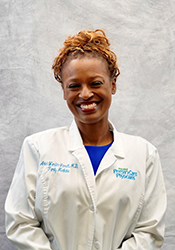Colorectal cancer is one of the most common cancers in the U.S., yet it’s also one of the most preventable. With early detection and lifestyle changes, you can dramatically lower your risk. Colorectal cancer is often diagnosed at advanced stages when treatment options are limited, so, the most important step you can take is to stay on top of your screenings and reduce your risk factors.
Here’s what you need to know to protect your gut health and take charge of your future.
What Is Colorectal Cancer and Who’s at Risk?
Colorectal cancer begins in the colon or rectum and often starts as small growths called polyps. Over time, some of those polyps can turn into cancer.
Who should start screening?
- Everyone should begin regular colorectal cancer screenings at age 45.
- Individuals with a family or personal history of colorectal cancer, genetic conditions (like Lynch syndrome), or inflammatory bowel disease may need to start screening earlier.
What are the most common risk factors?
- Age: Most cases occur in adults over 45.
- Family history: A family history of colorectal cancer or polyps can increase your risk.
- Personal history: Women with uterine polyps can have a higher risk for colorectal polyps.
- Genetic conditions: Conditions like Lynch syndrome or familial adenomatous polyposis (FAP) raise the risk significantly.
- Inflammatory bowel disease: Crohn’s disease or ulcerative colitis increases the likelihood of developing colorectal cancer.
- Type 2 diabetes: People with type 2 diabetes face a higher risk, even after accounting for shared factors like weight or inactivity.
If any of these apply to you, talk to your provider about starting screenings earlier or more frequently.
Change What You Can: Lifestyle Risk Factors
More than half of colorectal cancer cases are linked to lifestyle factors that you can control. By making healthy changes, you can lower your risk factors for colorectal cancer:
- Achieve and maintain a healthy weight: Being overweight or obese increases your risk, especially for men. Losing even a small amount of weight can help.
- Eat a healthier diet: Limit red and processed meats, such as hot dogs and bacon, and focus on a diet rich in fruits, vegetables, and whole grains. Cutting back on sugary drinks can also make a difference.
- Stay active: Regular physical activity can significantly reduce your risk of colorectal cancer and improve overall health.
- Quit smoking: Smoking isn’t just linked to lung cancer; it’s also a major risk factor for colorectal cancer. Quitting now can lower your risk over time.
- Limit alcohol intake: Heavy drinking is associated with higher colorectal cancer risk. It’s best to avoid alcohol, but if you drink, limit yourself to no more than one drink per day for women or two for men.
Talk to Your Provider About Your Risk Factors
Are you over 45? Do you know your personal risk factors? The best time to take action is now. Talk to your MPCP provider to discuss when you should start screenings and how you can live healthier and lower your colorectal cancer risk.





